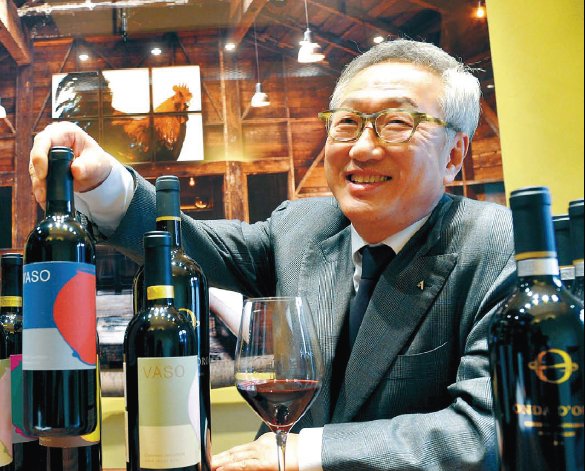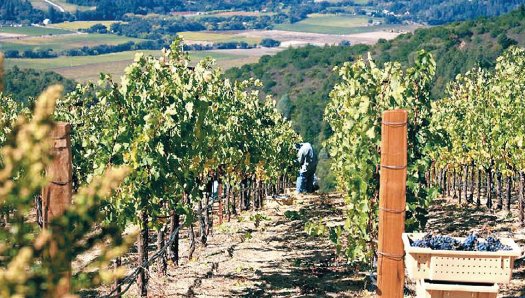동아원그룹 이희상 회장은 와인 애주가로서 최상의 와인을 수입하고 제조하는데 힘쓰고 있다.
이 회장은 한국인들에게 와인이 낯설게 다가오던 1997년에 세계의 유명한 와인을 한국에 들여온 장본인이다. 그는 2005년 나파 밸리의 다나 에스테이트(Dana Estates)를 인수하여 2006년부터 본격적으로 와인 만들기에 돌입했다.

한국에 와인 문화를 전파한 동아원그룹 이희상 회장 (박현구/코리아헤럴드)
이 회장의 노력은 2009년에 ‘다나 에스테이트 로터스 빈댜드 2007(Dana Estates Lotus Vyd Cabernet Sauvignon 2007)’이 와인 평론가 로버트 파커로부터 100점을 받으면서 와인업계에 큰 이슈가 됐다. 3년만인 2010년에 ‘로터스 빈야드 (Lotus Vineyard) 2010 카베르네 소비뇽’이 한번 받기도 힘든 100점을 다시 한번 받게 됐다. 파커가 부여하는 점수 100점은 세계 최고 품질의 와인을 뜻한다.
“한국의 와인 문화가 처음 와인 사업을 시작할 때와 많이 바뀌었다,”고 이 회장이 말했다.
아버지의 밀가루 사업을 물려받고 나서 이 회장은 고부가가치 제품들을 개발하는데 주력했다. 동아원그룹은 밀가루, 메밀, 농산물, 가축사료, 특수사료에 이어 와인과 외식산업에 주력하고 있다. 최근에 동아원은 페라리와 마세라티를 수입 판매사업을 담당하고 있다.
“사람들은 내게 왜 와인과 페라리를 수입하게 됐는지 물어봅니다. 하지만 모든 분야에 최고만 추구하는 내 비전과 잘 맞아 떨어지고 있죠,”라고 이 회장은 말했다.
“제가 처음 와인을 접해 본 것은 1978년 33세 때 스키장 리조트에서 김치찌개와 함께 먹었을 때 입니다. 그 때 너무나 맛있어서 와인을 수입하는 사업을 하기로 마음 먹었습니다.
“1997년 IMF 경제위기를 겪고 있어서 와인 사업이 잘 안되지 않을지 걱정했는데 밀가루 시장과는 달리 와인 시장은 크게 타격을 입지 않았습니다,”고 이 회장이 회상했다.
이 회장은 최고급 와인을 사람들에게 전파하기 위해서 다양한 와인을 사람들에게 선물했다고 한다. 하지만, 나파밸리에서 많은 수량을 독점적으로 수입해 올 수 없기 때문에 한국의 레스토랑과 호텔을 직접 찾아 다니며 와인 세일즈 양을 확보했다.
그의 사업은 현재 150여개의 와인을 보유하고 있는 약 32억원 매출 규모를 자랑하고 있다. 이러한 대성공 뒤에는 나파 밸리 사람들과 쌓은 인적 네트워크가 큰 영향을 미쳤다.
하이츠 셀라회장 조 하이츠의 장례식 참여한것과 그레이스 패밀리 포도원의 와인을 얻기 위해 주주 딕 그레이스와 함께 티벳으로 봉사활동을 갔던 것은 한국 방식으로 인맥을 쌓은 노력이다.
이 회장은 신사동에 와인바, 와인샵, 와인교육기관이 모여있는 ‘포도플라자’라는 와인 문화센터도 오픈했다.

나파밸리의 로터스 빈야드 (다나 에스테이트)
이 회장의 꿈은 와인을 통해 한국의 국가 이미지를 제고하는 것이다.
“나파밸리 사람들은 북한 문제 때문에 한국에 오는 것이 안전하지 않다고 생각한다. 하지만 싸이의 국제적 성공과 삼성과 같은 한국의 글로벌 브랜드로 인해 이미지가 많이 좋아졌다고 생각한다. 세계적인 와인을 제조하고 보유하고 있는 것 또한 우리의 국가이미지를 높이는데 기여할 수 있을 것이라고 생각한다,”고 이 회장이 전했다.
이우영 기자/코리아헤럴드
(
wylee@heraldcorp.com)
<영문 기사>
Shaping Korea’s wine culture
DongA One Group Lee Hi-sang’s journey of making the world’s best wine
By Lee Woo-young
Lee Hi-sang, chairman of DongA One Group, savors every last drop when he drinks wine. He calls each drop “blood and sweat.”
As a wine lover, he not only imports some of the best wines in the world to Korea, but also works from scratch to make top-quality wine that is internationally recognized.
Lee introduced some of the world’s most famous wines to Korea in 1997 when Koreans were more into soju or beer. In 2005, he entered the world of winemaking by purchasing Dana Estates in Napa Valley, California.
His endeavor began to bear fruit in 2009 when his 2007 Lotus Cabernet was given a perfect score of 100 points from esteemed wine critic Robert Parker. His winery rose to an instant stardom in the wine world. Three years later, the 2010 vintage received the same score.
In the meantime, Korea also saw a changing trend in its drinking culture. Sales of wine at discount chains in Korea outstripped those of soju for the first time in December last year.
“Wine culture in Korea has changed remarkably since I started my wine business. I think it has become a part of people’s lifestyle,” Lee said in an interview with The Korea Herald on Tuesday at his steak restaurant The Barn in southern Seoul.
After taking over his father’s flour mill business, Lee expanded to top high-value-added products to gain advantage in the competitive market.
His company covers a wide array of businesses from flour mills, livestock feed, pet food, grain production to wine and dining. Recently, the company became the official importer of Ferrari and Maserati.
“People ask me why I import wines and Ferrari, but this is all part of my vision to pursue the best in everything,” said Lee.
He said proudly that having his wine receive top scores was also the result of following the goal to achieve top quality. “We proved that by making the best-quality wine,” he said.
First wine with kimchi stew
Lee didn’t drink alcohol until he had his first wine at 33.
“I went to a ski resort in Korea and had kimchi stew with a French wine. And it tasted really good,” said Lee.
He started to fall in love with wine, but found it hard to get a good wine in Korea back in 1978. So he decided to bring them to Korea and started a wine-importing business.
“I was quite worried in the beginning stage of my business because Korea was in economic crisis. But the wine business wasn’t so bad unlike my main flour mill business, which was hit hard by the economic situation,” he recalled.
With the aim of creating a sophisticated wine culture in mind, Lee started introducing various wines to people.
“I started by giving people wines for presents on special occasions like promotions and weddings. They liked it more than money,” said Lee.
But it wasn’t an easy task to secure a large enough supply from the exclusive society of Napa Valley.
“It was a series of challenges. It was hard to meet an owner of a winery and if we met, I had to persuade them on how I planned to promote them in Korea,” said Lee.
Then he began door-to-door sales at major hotels and restaurants in Korea.
According to his staff, he likes to serve wine for his employees and the habit might have come from the time he served them to his potential buyers.
“I felt really good when people started to recognize the wines I brought after numerous attempts to bring them to Korea. And at some point, I dreamed of making a wine of my own,” said Lee.
Now he boasts a wide collection of wines not only from Napa Valley, but also from all over the world. His wine business grew from sales of 2.7 billion won ($2.5 million) with a collection of 30 brands in 2000 to sales totaling 32 billion won with a collection of more than 150 labels.
Behind the success is Lee’s persistent effort to break in to the Napa Valley circles and make connections to bring more good wine to Korea.
He used a Korean way of socializing in the U.S. He attended the funeral of Joe Heitz, the owner of the Heitz Cellar, and participated in volunteer work in Tibet with vintner Dick Grace and his wife to get their wine from the famous Grace Family Vineyards.
“I couldn’t even dream about starting Dana Estates if I hadn’t had the connections I made for a decade in Napa Valley. When I was looking for a vineyard, I received tremendous help from them,” said Lee.
He bought three vineyards from 2005-2006 after much research and with valuable information from his friends.
With several trials and errors, he learned to focus on improving wine quality. As a result, his $275 wine was ranked first in the 2008 Napa Cabernet Sauvignon tasting event -- higher than Screaming Eagle and Harlan Estate, which are priced at around $2,000.
Wine as lifestyle
Lee established a wine cultural center called Podo Plaza in Sinsa-dong, Seoul, that features a wine bar, shop, tasting area, a wine academy and a culinary institution.
The wine bar “vin.ga” is the first wine establishment to receive recognition from a prominent American wine magazine. It was given the Award of Excellence from Wine Spectator’s Restaurant Wine List Awards in 2011 and 2012.
“There are only two restaurants in Korea to receive the international recognition. I think it is newspaper-worthy, but few people in Korea give credit for that,” said Lee.
He stressed there are many Michelin-starred restaurants in major places in Asia such as Singapore, Hong Kong, Malaysia and Indonesia, but not in Korea.
“I think we lack some kind of master spirit. We see many restaurant and bar owners close their stores and open new ones. It breaks their tradition. This is why the government should help and encourage owners to continue their tradition,” Lee noted.
His company is considered a master in the flour mill industry with 60 years of history. It also accounts for 40 percent of the flour supply in Korea and exports to foreign countries.
Lee intends to keep his success intact, and prepares for sudden changes in the global industry.
He forayed into the grain production industry to ensure a steady supply for his food business.
“I felt the urgency in food security when Australia said they wouldn’t sell any of their flour needed to produce noodles in Korea when they were in their worst drought,” said Lee.
On the other hand, Lee hopes he can contribute to enhancing the national image of Korea through wine.
“People in Napa Valley say they feel it would be unsafe to come into Korea with all the North Korea-related issues,” said Lee. “I think the success of Psy was backed by a positive image of Korea built upon achievements of Samsung and other brands in the global market. I believe having our wine ranked top also contributed to upgrading our national image as well.“
(
wylee@heraldcorp.com)







![[Graphic News] More Koreans say they plan long-distance trips this year](http://res.heraldm.com/phpwas/restmb_idxmake.php?idx=645&simg=/content/image/2024/04/17/20240417050828_0.gif&u=)